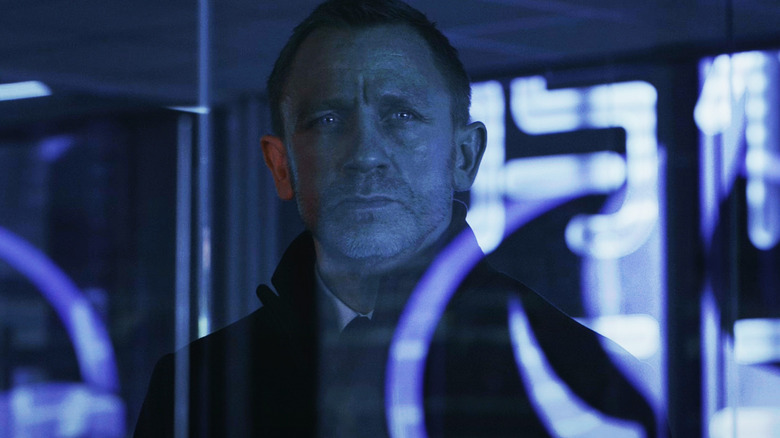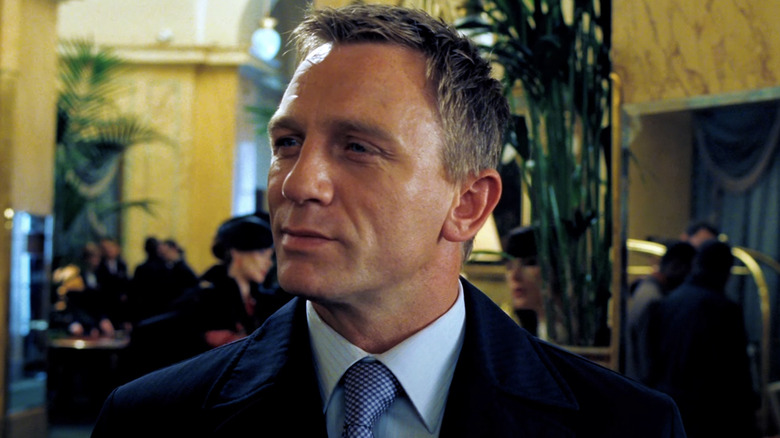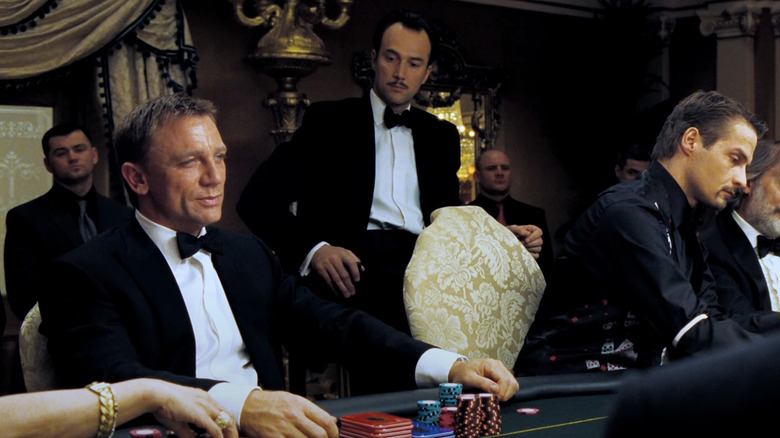The James Bond Movie That Finally Got 007 Unbanned From China
China has a long and proud history of banning anything that's even a little bit fun or cool. "Back to the Future," for instance, was banned in China. Why? Because time travel as a concept was deemed subversive enough that it might encourage citizens to reappraise the country's own history — I'm not kidding. China is so censorship happy that they even temporarily banned something as innocuous as "The Big Bang Theory," this time on the grounds that, well... the government never really clarified. Look, I'm not all that opposed to the idea of banning "The Big Bang Theory" outright, but it's the principle that matters here. China's government exerts control over art; you know, the thing that allows people to express their individuality and capture the imaginations of others, thereby bringing us all a little closer together? Yeah, China likes to ban that.
Falling somewhere towards the middle of the absurdity spectrum of Chinese censorship is the James Bond property. It might seem unbelievable, but 007 films were prevented from wide releases in China for decades, ever since "Dr. No" kicked off cinema's most enduring franchise all the way back in 1962.
Now, while it may seem as ridiculous as banning any other movie, you might be able to understand why China was a bit ticked off by England's greatest spy. After all, he didn't exactly stand for the kind of dogged commitment to decorum and rule-following that the Chinese Communist Party espouses. Oh, and he hated communism. All of which meant that Bond was persona non grata in China until fairly recently — shockingly recently in fact, as it took more than 40 years for a Bond movie to be granted the privilege of being shown in Chinese theaters.
No Mr. Bond, I expect you to follow the rules of the CCP
In 2006, the greatest James Bond movie ever made, "Casino Royale" debuted, with then new actor Daniel Craig playing 007. "GoldenEye" director Martin Campbell returned to help shepherd this new age of Bond, which like so many other action thrillers of the era, took its cues from the "Bourne" franchise, and gave 007 what was frequently referred to at the time as the "gritty reboot" treatment. "Royale" saw Craig's spy blowing up embassies in Madagascar, blowing up planes in Miami, blowing up Venetian palaces, and almost blowing the British government's money in a high stakes poker game against the private banker to the world's terrorists, Le Chiffre (Mads Mikkelsen). But alongside all the blowing stuff up, "Casino Royale" gave us the most human Bond yet, depicting the operative as a tortured soul who might still have a glimmer of humanity beneath his icy exterior — until Eva Green's Vesper Lynd snuffs that out by betraying him.
Apparently, all of that was enough for China to lift the ban on Bond. As Reuters reported back in 2007, "Casino Royale," or "Lingling Qi," became the first Bond movie to receive a wide release in the country, with distributor Sony Pictures sending 470 prints of the film to theaters countrywide — the most ever for a foreign release in China at that time. Craig, Green, and Campbell all visited Beijing for the premiere, with Craig telling Reuters that during his visit, someone on the street tried to sell him an illegal copy of the film, which had been pirated to DVD since its global release the year prior.
By that point, China's State Administration of Radio, Film, and Television, as it was then known, had outright banned 20 Bond movies, and there was never any official explanation as to why "Royale" was allowed to slip through the net. Sony Pictures China general manager Li Chow was, however, quoted as saying at the time, "This Bond is a new beginning. He is not fighting a country and Chinese officials did not request any cuts." In other words, Bond was no longer a figure of Western Cold War aggression and resistance to communism.
Casino Royale marked a major change for Bond films in China
What makes the Chinese release of "Casino Royale" truly surprising is that the government asked for no cuts to be made, allowing the film to run uncensored. When you consider that the State Administration of Radio, Film, and Television (now the National Radio and Television Administration) had routinely trimmed Hollywood productions for years prior to this, and had strict rules against glorifying gambling, it's truly remarkable that "Royale" was given the uncensored release it was. This is a film where the central scene revolves around a poker game — and a pretty damn entertaining one at that. If that's not glorifying gambling, I'm not sure what is.
An explanation might lie in the fact that, as The Guardian reported at the time, "Casino Royale" was "likely to become the highest grossing foreign movie ever in China." In the end, the movie made $11.7 million in the country, exceeding expectations. Which, in lieu of an official explanation for the lifting of the Bond ban, suggests the CCP is willing to put aside its principled dedication to upholding morality in the homeland if it means a significant boost to the economy.
Lamentably, the following film in the franchise, "Skyfall" — which featured a fantastic Shanghai fight scene — was required to make numerous cuts before it was given a Chinese release. As the BBC reported, among the requested cuts were a scene in which Bond offs a security guard in the aforementioned Shanghai sequence, references to sex work in Macau, and subtitle changes to elide talk of torture by Chinese security forces. Still, the wet blankets at the National Radio and Television Administration have let every Bond since "Royale" through, so that's something — though China did ban Martin Scorsese films from 1997 to 2012, a crime greater than any of the so-called transgressions that got Commander Bond barred from the country for 40 years.


